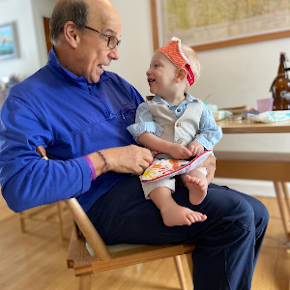“Something that sticks out for me about camp is the continuity and the tradition of camp. There’s people on staff who were campers for a long time and it’s a really great community of people. They’re not just friendships for the summer. They’re people who you stay in touch with for a lifetime.” –Colin Reasoner, Parent of a Mondamin camper
“ Tradition is a guide and not a jailer.” –Justin Scranton, former head of the Mondamin Canoeing program, quoting Somerset Maugham.
The other day I was paddling on the Nantahala River with Pharr Smith, who I met at camp in 1969. We’ve been friends for 54 years now and still enjoy the challenges of whitewater together. Among other duties, he is on the board of the Chief and Calla Bell Scholarship Foundation, a separate nonprofit foundation that raises monies to help make the summer camp experience affordable for more families. I recall him saying something like this as we floated between the rapids, autumn leaves suspended in the clear water beneath us: “You know, in a 100-year-old camp, a lot of these names we throw around have a lot of meaning from some generations and none at all for younger ones. How do we let the current camp community know who these people were?”
Here’s a little book that might help: Will Leverette has acquired a lot of wisdom from the waters. He is the grandson of Frank D. “Chief” Bell, the son of Chief’s daughter Pat and her husband William Leverette, and kin to many in the summer camp world that is about a century old in Western North Carolina, linked to Mondamin and Green Cove, as well as Camps High Rocks, Merriewoode, and other organizations like the Nantahala Outdoor Center. His book, A History of Whitewater Paddling in Western North Carolina–Water Wise, is a small book with big ideas in it. If you want to get a better understanding of the philosophy that underlies our camps’ belief in skills acquisition through practice in order to deal with bigger challenges at camp and in life, it is well worth reading.
The first thing you might notice about the grainy black and white pictures included here: “What? No life jackets???”
It was a different time, and pioneers often are seen using less gear than those who come after. Some of these pictures show people paddling rapids in wood and canvas canoes - the kind that now we only use on the lake. As Will explains in his book, Chief Bell believed that skill was more important than equipment and insisted that all campers were completely safe and confident swimming before they were allowed to get in canoes. Of course, today at camp we wear life jackets (PFD’s in modern acronym - Personal Flotation Devices) in all our water based activities of canoeing and sailing, but the core tradition remains the same: build your skills first. Campers still need to pass swim tests before they move down the walkway past the boat shop to the canoe and sailing docks and beyond them into lives of intelligently dealing with risk.
When I came to camp in 1969, this was the way that I learned: swimming first, then comprehensive drills and skills in the canoes on the lake and in small rapids so that when we faced more difficult rapids, we were ready. We still do things this way at camp, working hard through play at appreciating what John Updike once described: “…the tissue thin difference between a thing done well and a thing done ill.”
I was also, with Justin Scranton, a head of Mondamin Canoeing in the ‘90’s, insistent that we use PFD’s, not only on all our rivers, but on the lake as well. We honored our traditions but were not bound by them - something else that is still true at the camps: when the standards of care improve, we adjust and improve with them. Will Leverette also knows this: after the lessons learned early in life, he worked nationally as a risk assessment manager and a claims consultant to the insurance industry with the Worldwide Outfitter and Guides Association. He also has applied these lessons in his own life, dealing with a diagnosis of Multiple Sclerosis with a pragmatic courage - a living lesson for us all.
So his book is not really a comprehensive history of all whitewater in the region; rather, it is a deeply personal reflection on the philosophy of experiential education as practiced at Mondamin and a few other camps as taught on the fast mountain streams of this region. He lovingly looks at the insights and idiosyncrasies of Chief Bell and the crew of wise and eccentric adventurers he employed to teach life skills to generations of campers through play on the waters. These people had - and still have - crazy wisdom: John Delabar, Ramone Eaton, Randy Carter, Elizabeth “Bunny” Johns, John Burton, Lecky Haller…. If you want to get a sense of who we are, and how a camp that stresses a non competitive philosophy has produced many boaters who have participated in Olympics and World Championships, you should consider reading this book. It will give you insights on why we do what we do, and plan to continue to do, for another century or so.
You can get Will’s book, or learn more about it, easily: A History of Whitewater Paddling in Western North Carolina–Water Wise








